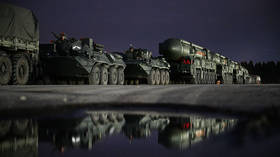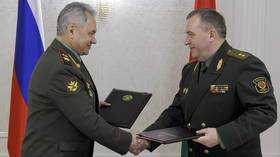Putin gives timeline for deployment of nukes to Belarus

The deployment of Russian nuclear weapons in Belarus will begin as soon as adaptation work at the relevant storage facilities is completed, around the first week of July, Russian President Vladimir Putin said during a meeting with his Belarusian counterpart on Friday.
“Everything is going according to plan,” Putin told President Alexander Lukashenko, adding that on July 7-8 “the preparation of the relevant facilities will be completed and we will immediately begin measures related to the deployment of the relevant types of weapons on your territory.”
Putin previously stated that he would discuss pressing security issues with Lukashenko “face to face” on Friday during an informal meeting in Sochi, part of which will be open to the press.
The president noted that “in general, the situation is stable, I would even go as far as to say that it is good. We are confidently cooperating in this sphere.”
Before concluding the open portion of the talks, Putin told Lukashenko that “there is always something to talk about. And that’s what we’ll do today.”
In late March, Putin announced that Russia would place its tactical weapons in Belarus in response to the UK’s decision to provide Kiev with depleted uranium munitions. The US and UK have insisted that uranium shells were “a commonplace munition” that “has been in use for decades.” Lukashenko, meanwhile, has repeatedly raised the issue of threats posed to his nation by nuclear arms deployed by the US in EU countries.
Washington and its allies in Europe have responded with outrage to the move, calling it an “irresponsible escalation and a threat to European security” and have warned that they will apply sanctions unless Minsk refuses to host Russian tactical weapons.
Moscow has dismissed the backlash, suggesting the West is “prone to hysterical reaction” and pointing out that Russia’s actions do not differ much from those of the US. It has also stressed that Minsk will not be able to use the nuclear weapons independently and that control over the munitions will remain with Moscow.













